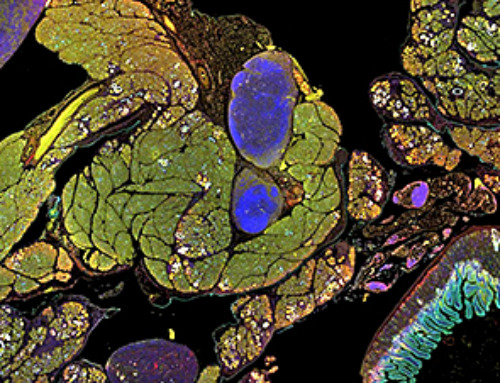A study of more than 22,000 people with multiple sclerosis (MS) has for the first time identified a genetic variant associated with faster progression of the disease, an accumulation of disability that can rob patients of their mobility and independence over time.
Multiple sclerosis begins as an autoimmune disease where the immune system attacks the brain and the spinal cord, resulting in symptom flares, called relapses, as well as longer-term degeneration known as progression.
Despite the development of effective treatments for the inflammatory autoimmune disease, none can prevent increased disability during the neurodegenerative phase of the disease.
The new study, which includes researchers from Yale and was published in Nature on June 28, is the first to identify a genetic variant that increases disease severity, an advance that the authors say offers a key step toward understanding and eventually fighting this progressive form of MS.
“While we have identified genetic variants that are predominantly immune related associated with risk of developing MS, this is the first study to identify neuronal genetic variants associated with the neurodegenerative aspects of the disease,” said Dr. David Hafler, the William S. and Lois Stiles Edgerly Professor of Neurology and Professor of Immunobiology at Yale School of Medicine, chair of the Department of Neurology, and an author of the study.
The work was the result of a large international collaboration of the International MS Genetics Consortium (IMSGC), which consists of more than 70 institutions from around the world. Hafler is a co-founder of the IMSGC.
Previous studies have shown that MS susceptibility, or risk, stems in large part from dysfunction in the immune system. Some of this dysfunction can be treated, slowing the progression of the disease.
But “these risk factors don’t explain why, 10 years after diagnosis, some MS patients are in wheelchairs while others continue to run marathons,” said Sergio Baranzini, a professor of neurology at University of California, San Francisco and co-senior author of the study.
For the first part of the new study, researchers combined data from more than 12,000 people with MS to complete a genome-wide association study (GWAS), a research approach that uses statistics to carefully link genetic variants to particular traits. In this case, the traits of interest were related to MS severity, including the years it took for each individual to advance from diagnosis to a certain level of disability.
After sifting through more than 7 million genetic variants, the scientists found one that was associated with faster disease progression. The variant sits between two genes with no prior connection to MS, called DYSF and ZNF638.
They found that MS patients with two copies of the gene variant, located near the two genes that help repair damaged cells and one that helps control viral infection, experienced faster disease progression. The location of the variant suggests a possible mechanism for accelerated progression.
“Inheriting this genetic variant from both parents accelerates the time to needing a walking aid by almost four years,” Baranzini said.
“These genes are normally active within the brain and spinal cord, rather than the immune system,” said Adil Harroud, assistant professor of neurology at the Montreal Neurological Institute and lead author of the study.
“Our findings suggest that resilience and repair in the nervous system determine the course of MS progression and that we should focus on these parts of human biology for better therapies.”
The findings give the field its first significant leads to address the nervous system component of MS.
To confirm their findings, the scientists investigated the genetics of nearly 10,000 additional MS patients. Again, they found that those with two copies of the variant became disabled faster.
“This gives us a new opportunity to develop new drugs that may help preserve the health of all who suffer from MS,” Harroud said.
This work was supported in part by funding from the National Institute of Neurological Disorders and Stroke (which is part of the National Institutes of Health), the European Union’s Horizon 2020 Research and Innovation Funding Programme, and the Multiple Sclerosis Society of Canada.
Hafler is a Yale Cancer Center member in the Yale Cancer Immunology Research Program.
News
Studies detail high rates of long COVID among healthcare, dental workers
Researchers have estimated approximately 8% of Americas have ever experienced long COVID, or lasting symptoms, following an acute COVID-19 infection. Now two recent international studies suggest that the percentage is much higher among healthcare workers [...]
Melting Arctic Ice May Unleash Ancient Deadly Diseases, Scientists Warn
Melting Arctic ice increases human and animal interactions, raising the risk of infectious disease spread. Researchers urge early intervention and surveillance. Climate change is opening new pathways for the spread of infectious diseases such [...]
Scientists May Have Found a Secret Weapon To Stop Pancreatic Cancer Before It Starts
Researchers at Cold Spring Harbor Laboratory have found that blocking the FGFR2 and EGFR genes can stop early-stage pancreatic cancer from progressing, offering a promising path toward prevention. Pancreatic cancer is expected to become [...]
Breakthrough Drug Restores Vision: Researchers Successfully Reverse Retinal Damage
Blocking the PROX1 protein allowed KAIST researchers to regenerate damaged retinas and restore vision in mice. Vision is one of the most important human senses, yet more than 300 million people around the world are at [...]
Differentiating cancerous and healthy cells through motion analysis
Researchers from Tokyo Metropolitan University have found that the motion of unlabeled cells can be used to tell whether they are cancerous or healthy. They observed malignant fibrosarcoma cells and [...]
This Tiny Cellular Gate Could Be the Key to Curing Cancer – And Regrowing Hair
After more than five decades of mystery, scientists have finally unveiled the detailed structure and function of a long-theorized molecular machine in our mitochondria — the mitochondrial pyruvate carrier. This microscopic gatekeeper controls how [...]
Unlocking Vision’s Secrets: Researchers Reveal 3D Structure of Key Eye Protein
Researchers have uncovered the 3D structure of RBP3, a key protein in vision, revealing how it transports retinoids and fatty acids and how its dysfunction may lead to retinal diseases. Proteins play a critical [...]
5 Key Facts About Nanoplastics and How They Affect the Human Body
Nanoplastics are typically defined as plastic particles smaller than 1000 nanometers. These particles are increasingly being detected in human tissues: they can bypass biological barriers, accumulate in organs, and may influence health in ways [...]
Measles Is Back: Doctors Warn of Dangerous Surge Across the U.S.
Parents are encouraged to contact their pediatrician if their child has been exposed to measles or is showing symptoms. Pediatric infectious disease experts are emphasizing the critical importance of measles vaccination, as the highly [...]
AI at the Speed of Light: How Silicon Photonics Are Reinventing Hardware
A cutting-edge AI acceleration platform powered by light rather than electricity could revolutionize how AI is trained and deployed. Using photonic integrated circuits made from advanced III-V semiconductors, researchers have developed a system that vastly [...]
A Grain of Brain, 523 Million Synapses, Most Complicated Neuroscience Experiment Ever Attempted
A team of over 150 scientists has achieved what once seemed impossible: a complete wiring and activity map of a tiny section of a mammalian brain. This feat, part of the MICrONS Project, rivals [...]
The Secret “Radar” Bacteria Use To Outsmart Their Enemies
A chemical radar allows bacteria to sense and eliminate predators. Investigating how microorganisms communicate deepens our understanding of the complex ecological interactions that shape our environment is an area of key focus for the [...]
Psychologists explore ethical issues associated with human-AI relationships
It's becoming increasingly commonplace for people to develop intimate, long-term relationships with artificial intelligence (AI) technologies. At their extreme, people have "married" their AI companions in non-legally binding ceremonies, and at least two people [...]
When You Lose Weight, Where Does It Actually Go?
Most health professionals lack a clear understanding of how body fat is lost, often subscribing to misconceptions like fat converting to energy or muscle. The truth is, fat is actually broken down into carbon [...]
How Everyday Plastics Quietly Turn Into DNA-Damaging Nanoparticles
The same unique structure that makes plastic so versatile also makes it susceptible to breaking down into harmful micro- and nanoscale particles. The world is saturated with trillions of microscopic and nanoscopic plastic particles, some smaller [...]
AI Outperforms Physicians in Real-World Urgent Care Decisions, Study Finds
The study, conducted at the virtual urgent care clinic Cedars-Sinai Connect in LA, compared recommendations given in about 500 visits of adult patients with relatively common symptoms – respiratory, urinary, eye, vaginal and dental. [...]





















